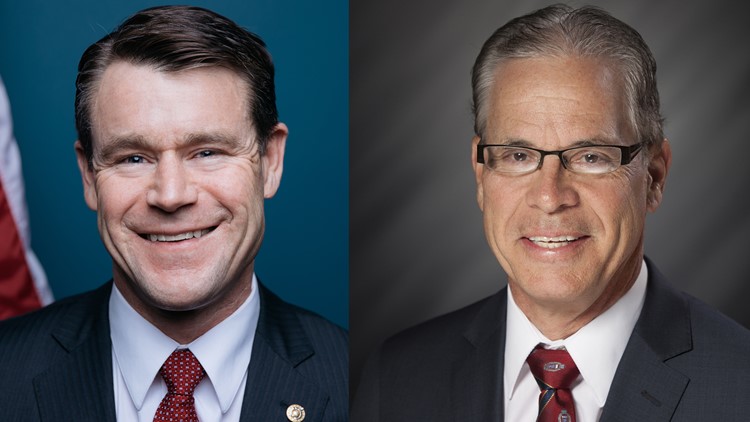INDIANAPOLIS — U.S. Sens. Todd Young and Mike Braun began the 117th Congress watching President Trump's coup d'etat roil the U.S. Capitol on Jan. 6, 2021, with an overt attempt at insurrection.
They ended this historic session on Dec. 23 when a $1.7 trillion Omnibus Spending bill included reforms of the Electoral Count Act of 1887 that had been used as a pretext by the Trump cabal to negate the peaceful transfer of power. As they had on Jan. 6, the two Hoosier senators split, with Young voting for the sprawling legislation that kept the federal government running, while Braun voted nay despite the implications for safeguarding democracy.
Last summer, Young joined a bipartisan group of senators backing reforms to the Electoral County Act of 1887. In addition to Sens. Susan Collins (R-ME) and Joe Manchin (D-WV), the senators involved in the bipartisan negotiations include Republicans Rob Portman, Mitt Romney, Lisa Murkowski, Shelley Moore Capito, Ben Sasse, Thom Tillis and Lindsey Graham along with Democrats Kyrsten Sinema, Jeanne Shaheen, Mark Warner, Chris Murphy, Ben Cardin, and Chris Coons.
“From the beginning, our bipartisan group has shared a vision of drafting legislation to fix the flaws of the archaic and ambiguous Electoral Count Act of 1887,” the senators said in a joint statement. “We have developed legislation that establishes clear guidelines for our system of certifying and counting electoral votes for President and Vice President.”
The key reform included a clear statement that the vice president's role in affirming the Electoral College count is ceremonial. President Trump and attorney John Eastman unsuccessfully attempted to convince Vice President Mike Pence to delay the proceedings, throwing the count back to the states.
The reforms also upped the threshold for contesting results. In the 1887 law, it took just one senator and one representative to challenge a state's elector. The new legislation raises that to 20% in each chamber. In addition to Braun, Hoosier lawmakers seeking to contest the 2020 election results included U.S. Reps. Jim Banks, Jim Baird and the late Jackie Walorski.
At 3 a.m. on the night after the insurrection, Congress voted to confirm the Electoral College vote that Democrat Joe Biden had won — 306-232 — after Vice President Pence had ordered the National Guard to secure the U.S Capitol. Biden had defeated Trump by more than 7 million popular votes.
That Young and Braun split on the matter was a continuation of the stances they took on Jan. 6. Braun had initially agreed to challenge the results from Arizona, saying, the “results of the Electoral College should not diminish the need to continue a thorough investigation into the irregularities and credible allegations of fraud.”
But at 9:30 p.m. Jan. 6, after a lethal event that killed one protester and injured more than 150 police officers (at least two would later commit suicide), Braun reversed course saying the insurrection had "changed things drastically" and that he would "vote to get this ugly day behind us."
A 72-page report by conservative jurists released in July refuted claims of widespread election fraud. “We conclude that Donald Trump and his supporters had their day in court and failed to produce substantive evidence to make their case,” the group wrote.
Young had been confronted by Hoosier constituents outside the Senate Russell Office Building on the morning of Jan. 6. An emotional and masked Young said, “My opinion doesn’t matter. And you know what, when it comes to the law, our opinions don’t matter, the law matters. I share that conviction that President Trump should remain president. I share that conviction, but the law matters. I took an oath under God, under God!”
In a statement, Young said, “As Congress meets to formally receive the votes of the Electoral College, I will uphold my Constitutional duty and certify the will of the states as presented. The people voted and the Electoral College voted. Congress must fulfill its role in turn. Like so many of my patriotic constituents and colleagues, I too wish the results of this election were different. I strongly supported President Trump and his agenda the last four years. I campaigned hard for him. But upon assuming this office, I took a solemn, inviolable oath."
In the Jan. 14, 2021 edition of Howey Politics Indiana, Young called the Jan. 6 insurrection the result of “a failure for many of our leaders to be truthful to the American people about what precisely has happened in our elections in recent months.” Asked if President Trump played a role in encouraging the violence, Young responded, “Of course. He’s president of the United States.”
On the same day, the Omnibus legislation passed, the House Jan. 6 Select Committee released its 814-page document detailing the findings of the panel’s 18-month investigation, according to the Associated Press, drawing on more than 1,000 witness interviews and more than a million pages of source material. The committee found a “multi-part conspiracy” orchestrated by President Trump and his closest allies, all with the aim of overturning his 2020 election defeat.
“Our country has come too far to allow a defeated President to turn himself into a successful tyrant by upending our democratic institutions, fomenting violence,” wrote the committee’s chairman, Democratic Rep. Bennie Thompson of Mississippi, in a foreword to the report.
According to analysis by the IndyStar, almost 20 Hoosiers have faced federal charges stemming from the insurrection.
The columnist is managing editor of Howey Politics Indiana/State Affairs at StateAffairs.com/pro/Indiana. Find Howey on Facebook and Twitter @hwypol.



